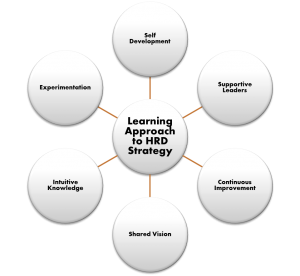Posted in Human Resource, Organisational behaviour, Principles of Management, Strategy
on May 24th, 2014 | 0 comments
What are Learning Organizations?
Need for Learning Organizations:
The ever evolving, dynamic business environment and the complex relationship among various countries in the political and business arena necessitate the need for a learning organization. This becomes essential for organizations to be flexible and be able to respond to change which is the only enduring source of competitive strength.

Learning Organization
What is a learning organization?
A learning organization is the term given to a company that facilitates the learning of its members and continuously transforms itself. Learning organizations develop as a result of the pressures facing modern organizations and enables them to remain competitive in the business environment. Learning is used to reach their goals and avoid repeating mistakes. Employees learn to link their personal goals to organizational goals and link rewards to key measures of performance. The managers learn to design systems and procedures to motivate learning process and to encourage employees to feel free to share information and take risks.
Characteristics of a learning organization:
- It nurtures a climate of trust in the organization and people are encouraged to learn and develop their #knowledge and skill sets.
- It inspires human resources in the immediate external environment such as customers, suppliers, creditors etc., to learn as and when possible.
- The whole business policy revolves around #HRD strategy.
- The organization subjects itself to continuous transformation in which learning and working run hand-in-hand.
Learning Based Techniques:
Organizational learning concept is the latest OD (#Organizational Development) technique. #Ernst & Young, the largest #accounting firm has set the following procedures for learning purpose.
- Managers play a vital role in this transformational process of learning. They are responsible for choosing employees who are willing to and capable of learning, and must ensure that the participants in the program are trainable. They must get the support of #trainees and others.
- Trainees must be appraised about the benefits that will result from training and the managers also should enjoy the support of supervisors, #co-workers and their sub-ordinates. This is very essential to facilitate learning process, to ensure availing of honor and respect of peers and sub-ordinates.
- The opinion of trainees, supervisors, co-workers and sub-ordinates must be obtained on the content of training, the location and the time and duration of the training.
- Managers also play a key role in assisting others in goal-setting and meeting those goals. Goal setting is necessary to improve their performance and direct their attention to specific #behavior that needs to be changed.
- Managers may assist the sub-ordinates and peers to identify tools and resources for acquiring knowledge.
- Managers must also focus on providing performance feedback as it serves two objectives; it provides information on performance and serves as a motivating tool.
- Managers should urge their employees to analyze their performance, identify weaknesses and take action to overcome weaknesses.
- Managers may assist the employee to transfer the learned skills/knowledge to work. It will be a wiser move to design #training methods in such a way as to enable the trainees to practice skills on their jobs between training sessions.
DOWNLOAD THE PDF VERSION